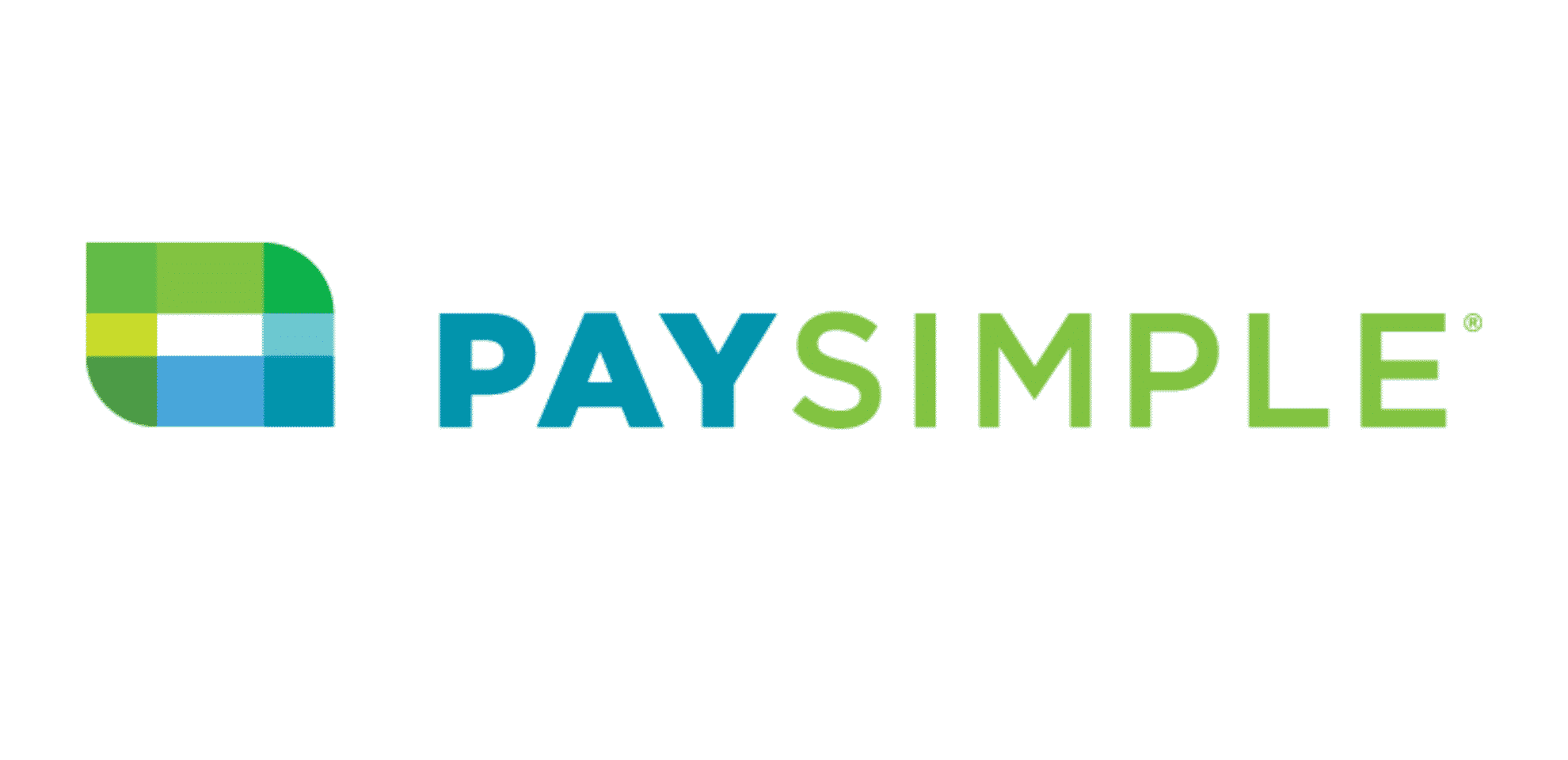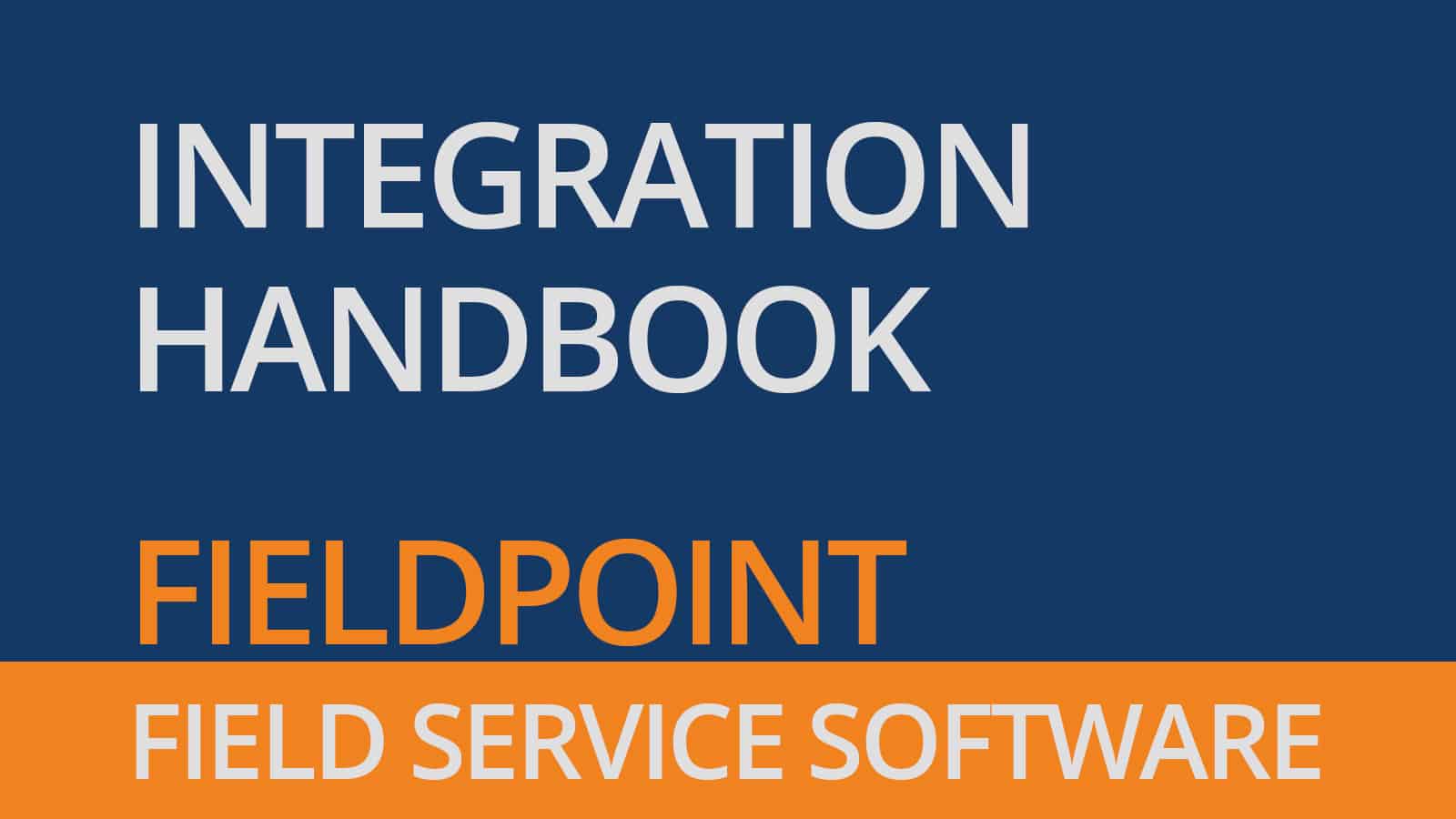Where Fieldpoint Comes In
Fieldpoint recognizes that our field service software is not the only software field service businesses are going to use. Our software is great for work order and contract management. We have a robust project module with job costing abilities, a powerful Business Intelligence tool to dive deep into analytics, an advanced scheduling and routing system to get technicians to the job site in an optimized fashion, and a powerful native mobile field service app for technicians to use in the field.
However, we understand that field service businesses are using CRM, ERP and accounting software for invoicing and customer management, as well as many other different systems to complete their daily field service work. So, Fieldpoint developed the Fieldpoint Data Transfer Service (FPDTS) to be able to build integrations with other systems. It is how today, Fieldpoint has a large assortment of software integrations that come out-of-the-box with an investment in our field service management software.
These integrations create the widely popular term, end-to-end field service experience, as information can flow through the field service software to any one of the connected systems to perform tasks. It is how Fieldpoint creates multiple layers of automation, beyond what is just inside our own software system. We leverage integrations to other systems to streamline many of the processes field service businesses are performing each day. And with it, we are reducing the manual labor time put into these tasks and mitigate the risks of errors in transferring mounds of information that is produced daily by field service operations.
Fieldpoint’s Out-of-the-Box Integrations
CRM, ERP and Accounting Systems Integrations
Customer Relationship Management systems (CRM), Enterprise Resource Planning systems (ERP) and accounting software are fundamental pieces to any field service software. It is in these systems that customer information is housed, as well as your parts and inventory, technician and other staff information, and the system you complete purchasing and invoicing in. These pieces of software go together with Fieldpoint’s field service software as a conduit of information that will eventually populate the Fieldpoint system.
These business management applications are typically integrated software solutions to field service software. That is because they can expertly handle core business aspects such as database management, customer management, and inventory and accounting while allowing field service software to handle the tasks related to quality field service operations.
CRM and ERP systems bring over the information used to populate Fieldpoint work orders, contracts, and projects, including customer information, addresses, phone numbers, and contact information. Product information, including descriptions of those products and inventory items that are used in Fieldpoint, come from these systems as well. And for purchasing, vendor information for where your business purchases equipment and parts are also available in Fieldpoint through the integration to your ERP and CRM system.
NetSuite Integration
NetSuite is a prime example of how an integrated ERP and CRM system works with Fieldpoint’s field service management software. This developed integration comes out-of-the-box ready to use and is one of the most powerful integrated software solutions Fieldpoint comes ready to connect with. Whether you are using NetSuite’s CRM system for management of customer information, or the ERP system for purchasing, business management and accounting, the integration between Fieldpoint and NetSuite brings an unmatched benefit of streamlining your operation to create a true end-to-end field service experience.
What makes this out-of-the-box integration unique is the connection between the Fieldpoint work order and the NetSuite sales order. Upon creation of a work order, an adjoining sales order is created in NetSuite. When time, materials or expenses are added to the work order, a line item is created on the sales order. If an item is not in stock, a requisition in Fieldpoint for parts and equipment will created a purchase order in NetSuite that will also be added to the sales order. This means accuracy in your billing, as each item applied to the work order has a counterpart on the NetSuite sales order.
The sales order and work order synchronization is just one of the many synchronized data points customers with NetSuite and Fieldpoint are able to utilize, as the Fieldpoint system is initialized by the customer information provided from NetSuite’s CRM system. That includes customer names, addresses and contact information, which when updated in NetSuite, automatically updates in Fieldpoint to reduce errors. Inventory data is also shared, as a real-time look into the stock numbers and location of inventory is available in Fieldpoint on the work order, populated from NetSuite, for accurate parts allocation.

QuickBooks Online Integration
Many field service businesses, from small to enterprise run QuickBooks Online as their accounting and ERP system. And a trend with these smaller businesses is that they generally have QuickBooks first, and then add a field service software to the business. So, that’s why Fieldpoint made sure to have an out-of-the-box integration between our field service software and the QuickBooks software, for an easy transition of information that has already been created in QuickBooks.
A running trend between CRM, ERP, and accounting systems is that the Fieldpoint software is initialized by the transfer of information from a system like QuickBooks. Customer information, vendors, resources, equipment, and more are brought into the Fieldpoint system, which ensures accuracy in the information coming in and limits double-entry. Fieldpoint also enables the creation of new customers in the Fieldpoint system that will create the customer in the QuickBooks system.
For accounting purposes, when a work order is closed it can be exported to the QuickBooks online software and automatically, an invoice is taxed according to the tax option you selected, and an invoice is made. That invoice is then also automatically returned to the Fieldpoint system. It is a quick flow of information that makes it easy for users of Fieldpoint and QuickBooks to get invoices to their customers.
Similar to NetSuite, QuickBooks Online also enables Fieldpoint users to see real-time inventory levels in the Fieldpoint system in order to ensure stock is on hand when applying parts to work orders and making it easy for parts to be requisitioned when they need to be ordered in.

Microsoft Dynamics 365 Business Central and Navision Integration
The latest out-of-the-box integration Fieldpoint has added is the integration to two Microsoft Dynamics 365 productions – Business Central and Navision. These ERP systems offer a seamless transfer of information, such as customer, employee, vendor, and product information, and creates multiple synchronized data points to ensure information is accurate in both systems.
An adjoining sales order is created in the Dynamics product to the Fieldpoint work order, so information, items, time, and materials added in Fieldpoint are also placed on a sales order created in Business Central or Navision. This reduces the time for processing invoices, as information is accurate and added from the work order for a detailed account of the work completed.
The integration also offers real-time inventory controls to see the quantity and location of all inventory products in stock. As well, purchasing controls allow users of Fieldpoint to purchase parts and have those purchase orders end up on the adjoining sales order created when the work order was created in Fieldpoint.

SalesForce Integration
SalesForce is a powerful CRM system that many companies use to manage their customer data. So like other CRM systems, that customer data can be used to populate the Fieldpoint software with the most accurate information about customers, contracts, and products.
Sales and marketing opportunities can also be converted into Fieldpoint work orders, project tasks, and maintenance agreements. Allow your salespeople to work within the SalesForce software and transfer their work on selling installation projects, maintenance contracts, and individual repairs into actual, fully quoted projects in the Fieldpoint system, complete with tasks, or maintenance contracts with preventative maintenance schedules. This out-of-the-box integration ties together your sales team and your service team, who now share the same data and work with an integrated system that connects them to each other.
See Our Field Service Management Software in Action
Workforce Management Systems Integrations
A growing trend in field service management is to expand your workforce or retrofit your workforce with subcontractors and third-party vendors. Many field service businesses are complementing their in-house workforce, or even going complete with subcontractors as a way of doing business. That is because, unlike in-house and full-time technicians, you are only paying for the work the subcontractor is completing.
So, during slow times, you are not paying for technicians that you do not need. But also, during busy times, if you need extra hands, you can send work to your subcontractors. It is also how businesses expand into new territory, be it in a different type of service or geographical location but adding skilled subcontractors in that area.
Workforce management systems are a way for field service businesses to get their work out to subcontractors for them to bid on jobs. It handles things like onboarding technicians, transferring information such as the work order and checklists to be completed, and ensuring the subcontractor is paid for the work they complete. Fieldpoint has built out-of-the-box integrations with workforce management systems so that customers do not need to leave their Fieldpoint software but can still access these workforce markets in order to hire skilled workers for a wide range of work.

WorkMarket
The integration with the WorkMarket system allows Fieldpoint users to stay inside the Fieldpoint field service software, but get their work orders to WorkMarket, without having to duplicate entries. It is very time-consuming to build the work order in Fieldpoint and then transfer that information into WorkMarket, as well as any accepted bids and quotes. Plus, working in two systems can mean mistakes are made, information is missed, and more time is spent processing.
Create your work order in Fieldpoint and import it into WorkMarket for subcontractors to bid on. Review the bids and quotes the subcontractors provide and accept the winning bid. Technicians can then accept the assignment using the same mobile field service app your in-house technicians use. For the subcontractor, they work within the WorkMarket system and see all the data, information and tasks in that system. They submit final work to WorkMarket, which is then transferred to the Fieldpoint software. From there, invoices and reports can be generated to finalize the work with the customer. In Fieldpoint you can prepare a payment voucher based on the accepted rates for the job and quickly get the subcontractor paid.
Tax Automation Integrations
Depending where you operate, taxes can vary from location to location. To ensure the correct tax is calculated, based on national, state/provincial and local taxes, some field service businesses are using tax automation software to ensure compliance with the tax code. This automated system works with an ERP and accounting system to calculate taxes on work orders, parts and equipment properly, in accordance with the tax law.

AvaTax by Avalara Integration
Fieldpoint has an out-of-the-box integration with AvaTax that works with ERP, POS, and e-commerce systems to provide accurate sales tax calculations, to ensure compliance with any level of tax code. This cloud-based software enables field service businesses to manage compliance with the tax code and calculates the accurate amount of every work order, contract, and project invoice that goes out. As new tax rules come in, AvaTax automatically updates to ensure you are always meeting the laws and rules of your jurisdiction when pertaining to taxes. This works specifically well if you are running an operation that works in different states that have different tax codes.
Mobile Payment Processing Integrations
Getting paid for the service work you complete can be challenging. It requires processing work orders, sending them to customers and following up to ensure payment is made. That can be time consuming for delinquent customers, and severely affect your cash flow, which is very harmful for small to medium size businesses. That is what makes mobile payment processing solutions of particular value to field service businesses who want to offer their customers a chance to pay as soon as the work order is completed. This is particularly useful for residential field service businesses, and small businesses who want on-the-spot payment to be made by customers.

PaySimple Integration
Fieldpoint’s native mobile app, MobilePro, has integration to PaySimple’s AppConnect, which enables mobile payment processing. Technicians complete work orders on the MobilePro app and upon completion, have invoices generated automatically. They can then start to take full or partial payment from the customer, which brings up Pay Simple’s AppConnect app to complete the credit card transaction. If the payment is approved in AppConnect, the technician is returned to MobilePro with a confirmation. The payment, if made in full, can then be exported to an ERP or accounting software to finalize the payment.
See Our Field Service Management Software in Action
Email Scheduling Integrations
Scheduling technicians is one of the most critical parts of field service management. Getting your technicians from job site to job site is a task for your dispatchers, and depending on how you run your operation, it could be one of the most time-consuming tasks. Do your technicians have to come back to the office every time to pick up new work orders? Or do they have to come in to see their appointments scheduled for the day? Not every field service business is running a mobile field service app, but mobile phones are so prevalent that technicians will have their own, if not a company phone. So, there are ways to use automated scheduling to get technicians from job to job, without them coming back to the office each time.
Field Service Dispatch Software is one solution, but another method is through email, which is still widely used in field service. Scheduling a technician through email services can reduce the amount of time spent coming back to the head office for instruction while giving technicians the information they need for a repair on the mobile device.
Microsoft Outlook 365 Integration
For email scheduling, Fieldpoint has out-of-the-box integration with Microsoft Outlook 365. Appointments for work orders can be scheduled using the email service for single jobs or recurring jobs and show up in the calendar of the technician, as well as in the appointments section of the work order. From within Outlook, appointments can schedule with a Fieldpoint add-on, which adds a Fieldpoint button to Outlook 365 and an appointment screen that looks similar to the Fieldpoint appointment screen.
From here, notes can be added to the body of the email to add notes to the appointment, parts can be added, and the appointment can be attached to a work order. Once completed, it synchronizes with the Fieldpoint system to create an appointment in Fieldpoint. Recurring appointments can also be added by creating recurring meetings. A master appointment is created from which all other appointments are generated, which is perfect for weekly or daily maintenance that needs to occur.
Work Order Creation Integrations
Not all work orders begin in Fieldpoint’s field service software. Other software solutions can trigger work order creation automatically. This is why field service automation is so important to the industry, as work orders do need to run through field service software, but there is a need to be able to trigger those work orders or request them from systems outside of that software. Especially for the facilities management and maintenance industry, where service requests for repairs would come in through another system but still generate work orders in Fieldpoint.

ServiceChannel Integration
For facilities maintenance and management, Fieldpoint’s integration with Service Channel enables employees to request a service repair through ServiceChannel, and then have it created a work order in Fieldpoint. It is a way for facility managers to manage their in-house technicians or subcontractors to complete work while using a field service software for scheduling, mobile apps for compliance and reporting, and a work order management system to house all the work completed.
How Fieldpoint and Integrations Add Value
Automation is a driving force behind field service management and to push the boundaries of automation, you need to integrate to different software systems. Fieldpoint can expertly handle field service management, including work orders, preventative maintenance contracts, and project installations, however, like many field service software solutions, it needs connections to ERP, CRM, accounting and many other systems to make it a complete end-to-end solution.
To automate as much of your business as possible, you need integrations that provide a seamless flow of information from one system to the other. This reduces the amount of processing time, data entry time and limits the number of possible errors that could come out of those activities. It also speeds up the processing of things like invoice creation, by moving information from Fieldpoint into a system this is designed for invoices and payments.
Fieldpoint’s list of out-of-the-box integrations continues to grow, as Fieldpoint sees value in adding integrations that our customers will use to improve their business. And making those connections come out-of-the-box ensures the connection lines are already drawn into the core product of our field service software, so you can rest assured that you are getting the best field service experience possible.
See Our Field Service Management Software in Action

